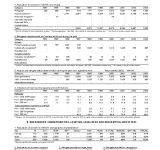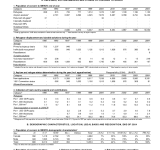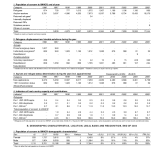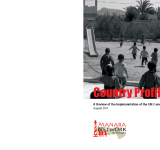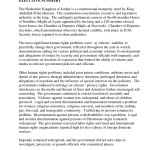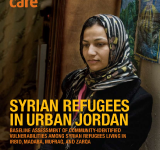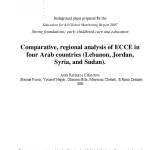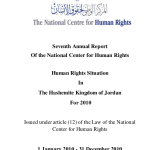refugees
The following report details statistical information regarding refugees;; asylum-seekers;; and others in Jordan accumulated by the United Nations High Commissioner for Refugees for the year 2004.
The following report details statistical information regarding refugees;; asylum-seekers;; and others in Jordan accumulated by the United Nations High Commissioner for Refugees for the year 2005.
The country profile component of the Manara project is a rigorous and exhaustive report on the status of the implementation of the Convention on the Rights of the Child. It aims to be a resource for identifying gaps and challenges on the status of the implementation of the Convention;; to highlight the recommendations of the Committee on the Rights of the Child on specific matters;; and to identify commendable practices implemented by the State;; civil society and the international community in addressing these issues. The information was collected by exhaustive literature review and followed by field research involving a series of interviews with identified stakeholders;; government ministries and institutions;; local and INGOs;; academics;; unions and professional associations;; media;; religious authorities and United Nations agencies were contacted and interviewed. The structure of the study is based on the following themes: human rights;; children’s rights;; child labor and violence against children
يهدف التقرير إلى عرض أهم مشاكل حقوق الإنسان في الأردن;; والتي كان ابرزها: سوء المعاملة ومزاعم التعذيب من قبل مسؤولي الأمن والحكومة مع الإفلات من العقاب;; والقيود المفروضة على حرية التعبير التي تحد من قدرة المواطنين ووسائل الإعلام في انتقاد السياسات والمسؤولين الحكوميين;; وشملت أيضاً ظروف السجن السيئة والاعتقال التعسفي والحرمان من المحاكمة العادلة من خلال الاعتقال الإداري;; والاحتجاز لفترات طويلة;; ومزاعم من المحسوبية ونفوذ المصالح الخاصة على القضاء. واستمرت الحكومة في التعدي على حقوق الخصوصية للمواطنين. وكان العنف ضد المرأة منتشراً على نطاق واسع;; واستمرار الاعتداء على الأطفال. والى جانب انه لا يزال التمييز القانوني والمجتمعي والمضايقات تمثل مشكلة بالنسبة للمرأة. وكان التمييز ضد الأشخاص ذوي الإعاقة مشكلة. وظل التمييز القانوني والمجتمعي ضد الأشخاص من أصل فلسطيني واسع النطاق. وذكر التقرير أن الحكومة قيدت حقوق العمال ومنظمات حقوق الإنسان المحلية والدولية على مستويات عالية من إساءة معاملة خدم المنازل الأجانب. ولقد كانت المواضيع الرئيسية في هذا التقرير هي: الحق في العمل;; الحق في الخصوصية والحق في التعليم;; والتمييز العنصري;; والتمييز ضد المرأة;; والحق في حرية التنقل;; والحق في حرية التعبير;; والحق في حرية تكوين الجمعيات;; والحق في حرية الدين ;; والعنف;; وعمالة الأطفال;; الحق في محاكمة عادلة;; الحق في المشاركة;; الحق في الضمان الاجتماعي.
This report is a baseline assessment of community-identified vulnerabilities among Syrian refugees living in Amman;; Irbid;; Madaba;; Mufraq;; and Zarqa. The purpose of this report is to identify urban Syrian refugees’ current coping mechanisms and any gaps in services available to Syrian refugees in Jordan. The research methodology is both qualitative and participatory in design;; drawing from the UNHCR tool for Participatory Assessment in Operations. This report presents only the data from household interviews;; baseline assessment;; and the follow-up focus groups conducted with community members. The number of households surveyed was 240;; with a total number of 1;;476 household members and 89 focus group participants representing 534 household members. The report proposed general recommendations and interventions to deal with the main highlighted challenges (cash assistance;; strengthening community links;; vocational training;; physical activities ...etc).
This report provides an overview of the status of early childhood care and education (ECCE) in Jordan;; Lebanon;; Sudan;; and Syria. It examines the contextual factors influencing ECCE;; highlighting current policies;; challenges;; and strategies for improvement and expansion. The report underscores the paucity and limitations of available data. Findings show that ECCE services have improved but regional disparity and dominance of the private sector prevail. None of the four countries but Jordan has a full-fledged national strategy and policy on ECCE. Challenges identified include lack of qualified teachers;; societal misconceptions about the unique features of early childhood;; and lack of research-based studies. Innovative projects show that NGOs have been instrumental in addressing the needs of marginalized children.
This annual report comes to diagnose the situation of human rights in the Hashemite Kingdom of Jordan in 2010;; and to point out the positive or negative changes that have occurred during that period. The report comprises the outcome of the accumulated experiences of the Center in the field of protecting civil;; political;; economic;; social and cultural rights. It also comprises a qualitative addition represented in the devotion of an axis related to the assessment of how serious the Government is in taking appropriate legislative;; judicial and executive measures needed to implement the recommendations by the treaty committees. The main themes are: Civil and Political Rights;; Economic;; Social and Cultural Rights;; Women's Rights;; Child Rights;; Rights of Persons with Disability;; Rights of the Elderly. The report proposes legislations;; policies and measures that are believed to contribute to changing the current situation of Human Rights for the better;; especially in the light of the rapid developments taking place in the Arab region.
